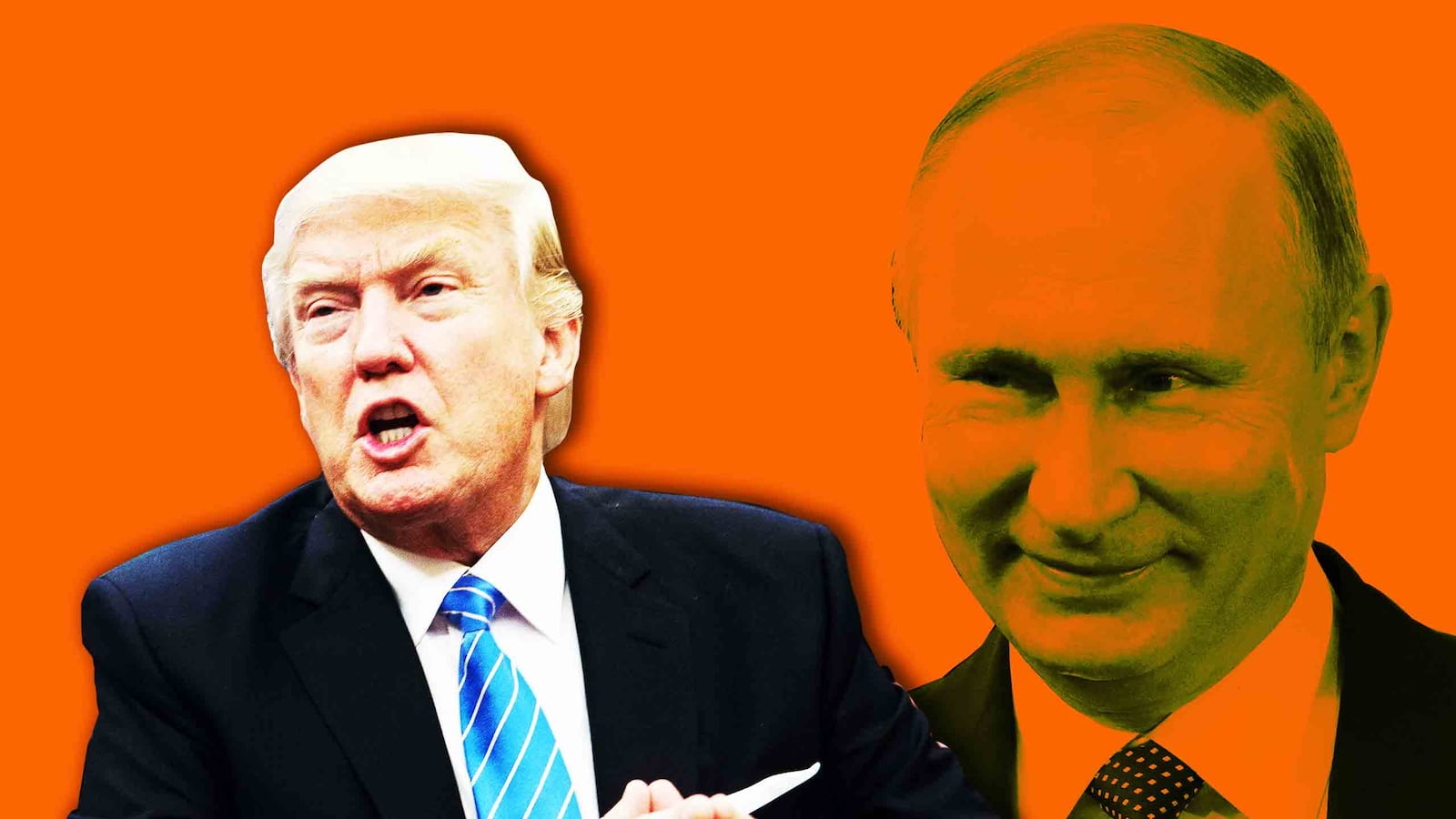PARIS—For a moment there the little guy who wants to make the Russian empire big again, President Vladimir Putin, must have been feeling small indeed at the Asian economic summit in Vietnam. China was the big player, sidelining even the United States, and Russia’s economy is puny compared to either.
Then, U.S. President Donald Trump saved him, not only puffing Putin back up, but handing him what anyone who has followed Russian policy in Ukraine and the Middle East must consider a major victory for Moscow. A joint communique was issued that made no mention of Ukraine whatsoever, and, in the name of fighting ISIS, embraced the longstanding Russian vision of “peace” in Syria.
But that wasn’t enough for Trump, who went on to tell reporters traveling with him that he really believes Putin when Putin says he had nothing to do with Russia’s massive efforts to subvert American democracy and, indeed, to get Trump elected.
In effect, as he has done before, Trump said he’d take Putin’s word over the information gathered and analysis made repeatedly by America’s own intelligence agencies. In their view, there is no question about Russian interference, and no question Putin was behind it.
The only question has been whether Trump or people in his campaign were complicit with the conspiracy, and that is the subject of the ongoing investigation led by Special Counsel Robert Mueller.
But Trump took Putin’s word.
“He said he didn’t meddle — I asked him again,” Trump said aboard Air Force One, according to The New York Times. “You can only ask so many times. I just asked him again. He said he absolutely did not meddle in our election. He did not do what they are saying he did.
“Every time he sees me he says, ‘I didn’t do that,’ and I really believe that when he tells me that, he means it. He says, ‘I didn’t do that.’ I think he is very insulted by it, which is not a good thing for our country.”
The move was all the more stunning because Putin had been in such a weak position. As The Daily Beast’s Anna Nemtsova reported from Moscow earlier, her sources told her the Kremlin prepared for this meeting with Trump for many weeks, making sure that the communique would deal with Syria, perhaps with a flick at North Korea, and that there’d be nothing on Ukraine, where Russian aggression in 2014 prompted harsh economic sanctions.
In the end, the joint statement was only about Syria, at a time when Russian and Iranian support have given the embattled Assad regime the wherewithal to start taking back its territory not only from the so-called Islamic State, which has been defeated already, but from the groups that the United States and Saudi Arabia, among other countries, have helped to fund, arm, and train in hopes they might at least reach a stalemate with Damascus that could lead to serious negotiations.
The statement carefully emphasized “successful enhanced de-confliction efforts between U.S. and Russian military professionals,” claiming those “dramatically accelerated” ISIS losses on the battlefield in recent months. These channels of communication “between military professionals” would continue, they said.
But on the ground the brunt of the fighting has not been shouldered by Russian, or, much less American military professionals. The ground forces on the Syrian (and Russian) side of the conflict have been lead by Iranian-backed and trained militias, including and especially Hezbollah—long deemed a terrorist organization by the United States and, especially and vehemently, by President Trump.
On the other side, with heavy U.S. backing, the main fighters have been in the Kurdish-led Syrian Democratic Forces, as well as some other groups that hoped, from the beginning, that they could overthrow the Assad dictatorship.
The “Geneva Process,” noted in the joint statement on Saturday was based on the notion that the war could be fought to a stalemate between the regime and its (non-ISIS) enemies where both sides would feel compelled to compromise.
That is no longer the case. To all intents and purposes, thanks to its Iranian and Russian support, the Assad regime is winning this war to stay in power, and the joint communique not only recognizes that to be the case, but endorses the outcome.
Will that bring an unsavory but much-needed calm to the region?
No. Because, as it happens, the Trump administration is almost as much in love with the de-facto rule in Saudi Arabia of Crown Prince Mohammed bin Salman as it is with President Putin in Russia.
Bin Salman’s aim is to roll back Iranian influence in the region. To that end he went to war in Yemen, helping to create what is today the world’s greatest humanitarian disaster, and last week raised the possibility Saudi Arabia would go to war against Iran in Lebanon.
The really big winner in all this?
In fact, it’s Tehran. While the Saudis huff and puff and mire themselves in conflicts they seem unable to win, perhaps drawing the United States into them as well, the Iranians continue to expand their influence with … Russian support.
As Wladimir van Wilgenburg reports after traveling to the Syria-Iraq border, once straddled by ISIS, but now cleansed of its fighters, the way has been opened for Iran to do precisely what Saudi Arabia and Jordan feared: open a land corridor through Iraq and Syria all the way to Lebanon.






